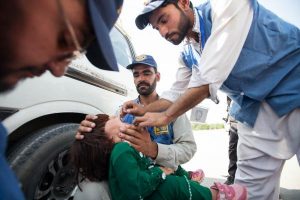Pakistan’s Rise to Zero
Transit vaccination: fleeting interaction, permanent benefit

At a busy toll plaza in Kohat, Pakistan, a three-member vaccination team is working fast.
Outfitted in blue Rotary vests and flanked by armed military personnel, the vaccinators approach a white van as it pulls away from the scattered stream of traffic, cars rattling east toward Islamabad and west to the nearby border with Afghanistan. One worker leans toward the driver to ask a question as another reaches into a cooler to prepare the vaccine. Among the crush of passengers in the van, they identify one child who has not yet been vaccinated.
There is no time for second-guessing.
There is not even enough room for the boy to crawl toward the front of the vehicle or through one of the doors; a relative must hand the young child to the vaccinators through one of the rear windows. He is quickly inoculated with two drops of oral polio vaccine, and his pinkie finger is stained with purple ink to indicate that he’s received his dose. He cries as the vaccinator hurriedly passes him back through the window. The van speeds off, fading back into the dizzying hum of traffic, as the vaccinators look for the next car and child.
This scene plays out thousands of times a day at transit posts like this one — makeshift vaccination clinics set up at bus stops, border crossings, army posts, and police checkpoints across the country in an effort to reach children who are on the move.
Here in Pakistan, home to almost all of the world’s polio cases just a few years ago, these moving targets require a vaccination strategy as agile and stubborn as the virus itself. At hundreds of sites, teams of health workers verify that every child passing through receives the vaccine.
The interaction is fleeting — faster than getting a meal at a drive-through restaurant — but the benefit is permanent. Another child, another family, another generation is protected, and Pakistan moves one step closer to having zero polio cases.
Watch and read the full story













